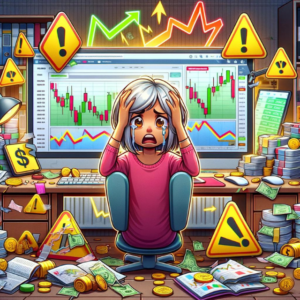Types of Forex Trading Accounts and How They Work
Whether you are brand new to Forex trading or looking for tips, tricks, or hints in your quest to take the next step in becoming a successful Forex trader, we want to help make you the best trader you can be. Here, we will give you a basic understanding of the different types of trading accounts available and how they work.
What is Forex Trading?
Forex trading is a way to make money by trading currencies. You can buy and sell these currencies online and profit from their fluctuating value. The Forex market is an excellent option for anyone who wants to learn to trade. While there is a lot to know and understand, various online forex trading courses walk you through what you need to know.
When getting into trading, you may start wondering about Forex trading accounts, how they work, and more. Luckily, while there’s a lot of information to consider, it’s not hard to learn to trade and get the information you need about Forex-funded accounts.
Forex Funding and Accounts
In the past, trading on the Forex market was very limited. In general, financial institutions did the vast majority of the trading, with very few individuals tossing their hats in the ring. This was due to the high funding amount needed to get started. However, over the years different types of trading accounts have been created. The implementation of these additional account types has made it easier for individuals to learn to trade in the Forex market.
Financial Institution Accounts
As in times past, financial institutions still play a big role in the Forex market. Banks and other financial institutions have a vested interest in how the global currencies ebb and flow. Because these businesses are a staple of the Forex market, it’s not surprising that they have their own category of account. Finance accounts are generally run and managed by people affiliated with the financial institution they are trading for. Finance accounts are typically the largest trading accounts on the market.
Margin Accounts
The majority of Forex funded accounts are considered margin accounts. These accounts are beneficial to traders because they allow you to trade more than you may currently have available. These accounts allow brokers to lend money to traders with the specific purpose of buying or trading financial products.
When opening a margin account, you will need to deposit a pre-determined amount of money that is used as collateral for the account. It’s important to remember that different brokers and companies that hold these accounts require different deposit amounts. Margin accounts are an attractive and beneficial option for those who are interested in learning to trade because you don’t have to front the entire cost of the trade yourself.
Trading Accounts
Trade accounts are independent accounts that allow you to trade currencies without leverage. At the core, a trading account is an account that holds your investments. While the term “trading account” can have a lot of different meanings and connotations, generally this is considered an account that is held separately from other investment accounts you may have.
Usually, a trading account is defined by the volume of trading that happens, the risk levels of the trades and/or the purpose of the activity. Trading accounts are most commonly used for day trading and other fast turnaround investments.
Demo Accounts
If you’re new to trading, you may want to consider setting up a demo account. Demo accounts are offered by a variety of trading platforms and are great for learning to trade. Basically, these accounts allow you to play around with the platform, get an understanding of how to trade, and learn the benefits and features of the platform. With a demo account, you can practice your strategies and get used to the interface without risking your own money.
You can open up as many demo accounts as you want, but you should only use one at a time. Having multiple open accounts will prevent you from being able to learn effectively.
Mini or Micro Accounts
As the name implies, mini or micro accounts are specifically designed for those who plan to make small trades and have a small amount of capital to invest. Generally, a micro account has a small minimum deposit of no more than $100. In some cases, you might be able to find micro accounts with deposits much lower than this.
It’s important to keep in mind that there are restrictions on micro accounts. Generally, these accounts also limit the types of trades you can make, only allowing micro or nano lots. These small accounts are perfect for those trying to learn to trade and dip their toes into the market.
Professional Accounts
On the other side of the spectrum, we have VIP or professional accounts. These accounts are generally held for those who have a lot of money to invest and can put down a significant amount toward their trades. It’s important to keep in mind where you are trading in the world because a professional account can mean different things in different places.
In the EU, for example, most traders have leverage limits that they are required to adhere to. Those with a professional account can have higher leverage limits but may be required to provide documentation, take a test, or otherwise prove their trading experience.
Swap-Free Accounts
In some cases, you can get an account that doesn’t require swap fees. This is called a swap-free account. One of the biggest draws to a swap-free account is that you won’t have to deal with additional fees if you hold your position overnight. Most traditional accounts have these fees that discourage long-term holding. There is a tradeoff, however.
Generally, swap-free accounts come with a variety of different restrictions, depending on where you open the account. They usually also have higher trading fees than more standard accounts. Because of this, most traders only go with a swap-free account if they are planning to hold onto their trades for a significant period of time.
Additional Considerations
Once you know about the different kinds of Forex funded account options available, you can make an informed decision on what type of account is best for you. However, there are some additional considerations that you might want to consider.
Brokers and Companies
There are a lot of brokers and companies out there that allow you to create your Forex funded account and start trading. However, not all brokers are created equal. It’s important to take the time to compare your options and choose the broker or company that will best suit your needs.
Take a look at whether the company you are considering offers additional benefits. Do they offer additional benefits along with the account? Do these benefits compliment or overlap other programs you are using? Understanding the benefits being offered, and whether or not they actually benefit you can help you make the right decision for your account.
It’s also a good idea to consider what requirements the broker has for traders they work with. If you are just starting to learn to trade, it’s not going to be helpful to try to work with a broker who only offers accounts to experienced traders. On the other hand, if you’re a seasoned trader wanting to expand your leverage, brokers who specialize in micro or mini accounts probably aren’t going to be beneficial. Most brokers offer information on their specialization and requirements on their website, but if you’re not sure it doesn’t hurt to ask!
Platforms
There are a variety of trading platforms that you can use. The platform you choose may be dependent on the broker you use. However, this isn’t always the case. It’s a good idea to know a little about the different platforms and which your broker recommends.
While we aren’t going to get into the speciifcs of the variety of platforms available in this article, it’s important to understand that there are different options when you’re getting ready to trade. MetaTrader 4 and MetaTrader 5 are currently the most popular options, but they are not the only options out there. Choosing the right trading platform can help you feel more comfortable and confident in your trades.
Luckily, most platforms allow you to create demo accounts, so that you can get familiar with how they work. This allows you to work in the platform and learn the style, quirks, and benefits of it before actually investing any real money. Consider trying out a variety of platforms before making a decision on which is best for you.
Initial Investment
One of the biggest things you’ll have to consider when choosing what type of Forex funded account you want is how much you have to invest. Many of the different types of accounts have specific minimums and investment requirements. While these may change somewhat from broker to broker, there are some basics to keep in mind.
If you’re just learning to trade and don’t want to put too much into your account to start with, you’ll want to seek out micro or mini accounts. In general, most standard accounts are going to have a higher initial investment requirement than micro accounts. On the other hand, if you’re ready to jump in and have a lot of capital to play with, you may want to consider larger account options.
It’s important to remember to only invest what you can afford to lose. When you first learn to trade, it’s an exciting time and it’s easy to get lost in that excitement. It’s generally best to start small and grow your account if you can only truly afford a small amount of capital.
Fees
Every trading account comes with a variety of fees that you’ll want to consider. Reputable Forex brokers don’t charge standard commissions. Instead, they get their commission based on the spread of the trade. However, the amount of the spread varies dependign on the broker and how they have structured their system. Brokers may charge a fixed spread, some base their fees on a percentage of the spread, and others base it on a variable chart.
Make sure you take the time to understand the fees that are associated with your trading, and how they compare with other brokers. This can help ensure that you’re getting the best deal available. Keep in mind that just because a particular fee style looks good on the surface, that doesn’t always mean it’s the best option for you. Do your research and choose a broker and account type that works well with your trading style and preferences.
Learn What You Need
If you’re still not sure what the best account option is for you and your trading style, make sure you do some research and learn what you need to know. Taking a Forex trading course is one of the best ways to learn more about the different types of accounts, how to work with brokers, and the other aspects of trading that you might not think about.
When you learn to trade with courses designed and taught by experienced professionals, you get the benefits of that experience. You’ll get tips and tricks that will help you make the right trades at the right times, but there’s more to it than this. You’ll also get information about things like how to properly set up your trading account, guidance on the platform to use, and information on what you should avoid.
While you can learn to trade without taking a Forex trading class, it’s a much longer, harder road. These courses can help you avoid common pitfalls, and allow you to make the most of your trades as quickly as possible. Forex trading for beginners doesn’t have to be a scary or nerve-wracking experience when you have a community behind you!






